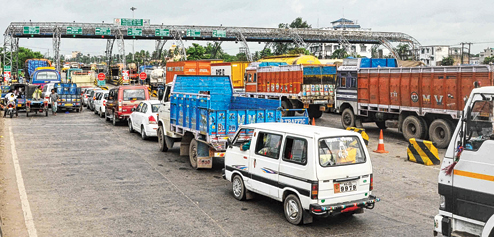
What was supposed to be a zip, zap, zoom corridor has turned into a slow lane because of inadequate infrastructure and lack of technical knowledge.
The Jala Dhulagarhi Toll Plaza at Dhulagarh, Howrah, boasts a radio frequency identification (RFID) lane - mandatory for all toll plazas, according to National Highway Authority of India (NHAI) guidelines - but Fastags are scarce and few cars use it. Result: a traffic bottleneck, especially in the morning and evening rush hours.
The queue of vehicles stretches to almost a mile and daily commuters, including factory workers, businessmen, traders and transport professionals, have to wait for anything between 15 minutes and half an hour to cross a toll gate that charges Rs 135 for a single day's up and down journey.
"That's quite a high toll," said Sukesh Jain, the superintendent of police (SP), Howrah Rural. "The queue generally forms at 8am and 8pm when goods vehicles are released to and from Calcutta. There is generally a pile-up of vehicles at that time."
The RFID lane has a camera that reads the tags on the vehicles and automatically lets them pass through. The Fastags are being marketed through ICICI Bank with a sales point at the toll office. The first lot of tags distributed had turned out to be faulty. "We bought the tags from the sales point at the Ashoka Buildcon office right beside the toll plaza. However, these tags did not work, the camera could not read the tags. We tried to get the tags changed for our vehicles but failed," said AK Sareen, the managing director of Ceratizit India Pvt Ltd. Employees of the wholly owned subsidiary of the Luxembourg-based Ceratizit Group travel from Calcutta to the Uluberia Growth Centre every day and are regularly delayed by 30 minutes.
Employees of Balaji Engineering, another company that has its factory beyond the toll plaza, is also facing the brunt.

The Dhulagarh toll plaza handles 30,000 vehicles per day and only 275 vehicles of them have bought the Fastags and use the RFID lane. This reporter did not see a single vehicle using the RFID lane. "Often trucks and buses without tags get onto the RFID lane and then they try to reverse. This leads to utter chaos," Sareen said.
Ashoka Buildcon, the agency that operates the toll plaza, has also employed hand-held remote terminals to clear the jam but its employees are at a loss about handling the devices. "They do not train their staff. Each time we cross the toll, we see a set of new faces fumbling with the hand-held devices," said Anik Pal, who crosses the toll gate on his way to work at Uluberia.
Smart cards have also been introduced. "One for those living within a radius of 20km and another for commercial vehicles," said Ravi Mishra, toll manager at the plaza.
The smart cards, too, are a source of delay with inexperienced staff failing to punch them. "They try several times before they can punch a smart card," said Deepak Haldar, a commuter.
Plans are on to widen the passage for two- and three-wheelers who do not pay toll at the plaza. "This will help clear the build-up of vehicles," said Mishra. "The delay was because of no-entry of goods vehicles during the festive season at places like Kolaghat, Birshibpur," he added.










